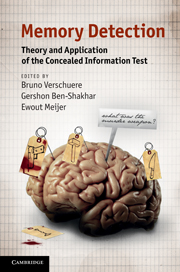
-
Select format
-
- Publisher:
- Cambridge University Press
- Publication date:
- June 2012
- February 2011
- ISBN:
- 9780511975196
- 9780521769525
- 9780521136150
- Dimensions:
- (228 x 152 mm)
- Weight & Pages:
- 0.66kg, 338 Pages
- Dimensions:
- (228 x 152 mm)
- Weight & Pages:
- 0.55kg, 338 Pages
- Subjects:
- Criminology, Applied Psychology, Psychology, Sociology
You may already have access via personal or institutional login- Subjects:
- Criminology, Applied Psychology, Psychology, Sociology
Book description
Traditional techniques for detecting deception, such as the 'lie-detector test' (or polygraph), are based upon the idea that lying is associated with stress. However, it is possible that people telling the truth will experience stress, whereas not all liars will. Because of this, the validity of such methods is questionable. As an alternative, a knowledge-based approach known as the 'Concealed Information Test' has been developed which investigates whether the examinee recognizes secret information - for example a crime suspect recognizing critical crime details that only the culprit could know. The Concealed Information Test has been supported by decades of research, and is used widely in Japan. This is the first book to focus on this exciting approach and will be of interest to law enforcement agencies and academics and professionals in psychology, criminology, policing and law.
Reviews
‘This set of high-quality contributions by a wide-ranging and distinguished group of experimental psychologists demonstrates that the CIT is indeed ‘an idea whose time has come'. Experimental psychologists now have a platform to scientifically investigate various facets of the detection of guilt. It is also potentially relevant to that fascinating psychological process: deception, or what, in animals, is the hiding response.'
John J. Furedy - Psychophysiologist and Emeritus Professor of Psychology, University of Toronto
Contents
Metrics
Altmetric attention score
Full text views
Full text views help Loading metrics...
Loading metrics...
* Views captured on Cambridge Core between #date#. This data will be updated every 24 hours.
Usage data cannot currently be displayed.
Accessibility standard: Unknown
Why this information is here
This section outlines the accessibility features of this content - including support for screen readers, full keyboard navigation and high-contrast display options. This may not be relevant for you.
Accessibility Information
Accessibility compliance for the PDF of this book is currently unknown and may be updated in the future.


